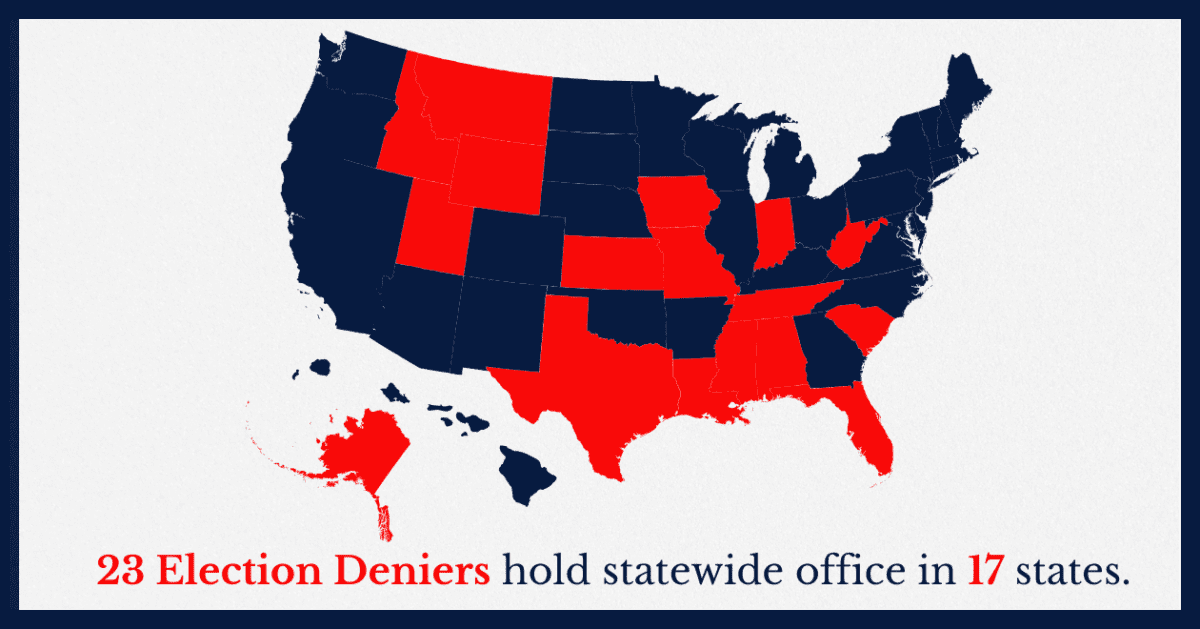
Anna Moneymaker/Getty Images
The 2022 midterm elections were in many ways a referendum on the future of American democracy, and in key states candidates who spread lies about the 2020 election and could have used their power to overturn future elections lost. In the six major battlegrounds where Donald Trump tried to reverse his defeat, election-denying candidates for governor, secretary of state, and attorney general all lost.
But it would be naive to conclude that the threat to free and fair elections has disappeared or even dissipated. Twenty-three election deniers in 17 states serve as either governor, attorney general, or secretary of state, according to a new report released this week by the States United Democracy Center, a nonpartisan organization that advocates for fair elections. That means a third of the country has an election denier in statewide office overseeing their elections.
According to the group, three election deniers are running for president—Trump, Florida Gov. Ron DeSantis, and California radio host Larry Elder—while a number of other GOP presidential hopefuls have amplified false claims about the 2020 election. Five election deniers are on the ballot in key statewide races in Louisiana and Mississippi this year.
“Even though voters overwhelmingly rejected election denier candidates in 2022, the movement is alive and well and continues to undermine trust in our democracy,” says Joanna Lydgate, CEO of States United Action.

Image courtesy of States United Democracy Center
The impact of this anti-democratic movement has been evident in a number of states this year.
Based on misinformation spread by far-right conspiracy theorists, nine GOP-controlled states have withdrawn from the Electronic Registration Information Center, an interstate partnership that helps make sure voter rolls are accurate by comparing voter registration data among states.
In Wisconsin, Republicans in the state Senate voted Thursday to oust the nonpartisan administrator of the state’s elections commission, Meagan Wolfe, in a bid to give election deniers and conspiracy theorists more control over how elections are run in the state. (The state’s attorney general is challenging the move in court, claiming Republicans don’t have the power to remove Wolfe because she was not formally renominated by the Wisconsin Elections Commission.)
In North Carolina, Republicans are on the verge of enacting two bills that would undermine fair elections. The GOP-controlled legislature passed one bill last month that undercuts Election Day registration, gives voters less time to cast ballots by mail, and expands voter challenges. The legislation was inspired, at least in part, by conservative activist Cleta Mitchell, one of the architects of Trump’s effort to overturn the election. Another bill that is close to final passage would prevent the state’s Democratic governor from appointing a majority of members to state and county election boards and lower the threshold needed to redo an election.
In Texas, the GOP-controlled legislature voted in May to abolish the position of election administrator and give the GOP-appointed secretary of state the power to take over election operations exclusively in Houston’s Harris County, the most populous blue county in the state.
“In some states, legislators are taking all sorts of steps to make life harder for trusted nonpartisan election officials, including firing them and stripping away their power,” Lydate says. “All fueled by conspiracy theories. This is just one piece of an entire election denier industry. It’s in state legislatures, on the campaign trail, in the media. It’s a whole movement that puts lies above free and fair elections, and we have to call it out everywhere we see it.”












